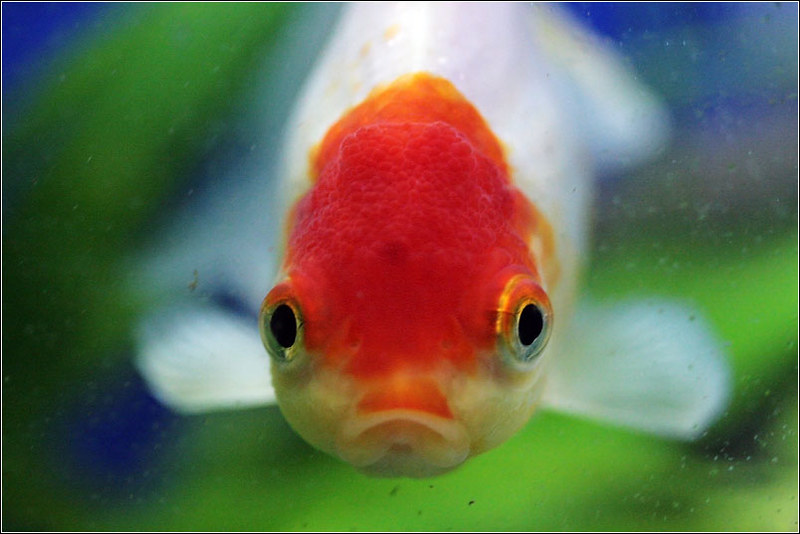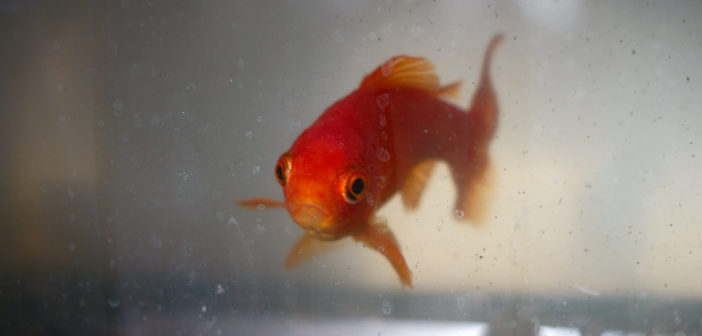Goldfish are among the most popular pets, and for many people they were probably the first pet in the household. They are cheap, they do not take up a lot of space and only need water and small amounts of food. But is it true that a fish who simply eats and swims in a bowl is a well-kept fish?
Definitely not. Fish are not very communicative to our eyes, and are often misunderstood and mistreated. First of all, it is important to understand that goldfish, like all other vertebrates, have feelings and can perceive pain and stress, therefore they need the same care and respect as any other pet. They are not merely disposable ornaments that can be flushed down the toilet once they become boring. Fish can actually live for several decades and owners should be aware of their needs and provide adequate care for them. Unfortunately, they are still given out as prizes in fairs and are purchased to become decorations, without any knowledge about space requirements, environmental enrichment and social housing.
Fish are actually intelligent and active creatures, but are often kept in such poor and deprived conditions that they are not able to express their full behavioral repertoire. They are forced to live in isolation in tanks or bowls that are too small. Goldfish can actually grow to 45 centimeters (18 inches) long, but more often remain small because of inappropriate feeding and poor quality of life. Although it is considered proper, a bowl is not a suitable home for a fish because it lacks sufficient filtration, aeration and space. The small size doesn’t allow for a stable environment as waste cannot be diluted, there is not enough oxygen that can be absorbed into the water and temperature levers can change rapidly, causing stress and even death. If they become too hot or too cold, goldfish can stop eating and become lethargic.

Moreover, health issues are not taken into account, and this is especially true for the fancy forms, who live with eye deformities and distorted backbones. Veterinary advice is usually not sought because of their low financial value compared to high veterinary care costs. Basically, it is easier and cheaper to buy a new goldfish instead of keeping one healthy and happy.
Life is not only made of heartbeats. Fish do have a sense of time and routine, but are often trapped in small spaces, alone and without enough space to swim and no environmental enrichment to stimulate their normal behaviors. Their life is always the same, day after day.
On this matter, here is an excerpt from This Is Hope: Green Vegans and the New Human Ecology, by Will Anderson:
“The term funktionslust comes from the German language and refers to feeling great about doing what one does best. We observe it all the time in other species: a dog runs freely on a hard-sand beach, a bird flies gracefully on the wind, a fox nurtures her kits, lionesses run down their prey. Funktionslust is observable across species. We experience it when we run, play, see the effects of our communication, and the good feeling we have when we succeed in our efforts. But think of the frustration we feel when, no matter how hard we try, our efforts fail, or when we feel helpless, hopeless, and powerless to satisfy what our deepest drives and desires tell us to do. If we are locked in solitary confinement, we are denied funktionslust. If we are crammed into a room full of strangers, given the same bland meal day after day, are restrained from moving freely, and not allowed to hear music, read a book, or converse with family, we are denied funktionslust. When we are chronically deprived of our funktionslust, life is not worth living. We become dispirited, depressed, lethargic, and eventually ill. It is perhaps the worst state of being we and other species can feel.
Like sentience, we do not know where funktionslust begins or ends. If it is anything like the ability to experience pain and fear, funktionslust may exist in other species where we do not expect to find it.”
Where is the joy of living in a fishbowl?
Featured image: a goldfish in a barren empty tank, as many are kept. Image credit haru__q, CC BY-SA 2.0.





